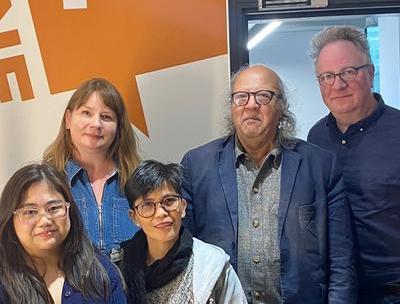Philippines: journalists under attack despite government commitments
NUJ expresses solidarity with journalists in the Philippines facing threats to their safety in targeted attacks within cities and provinces.
Len Olea, general secretary of the National Union of Journalists of the Philippines (NUJP) met with the NUJ and the International Federation of Journalists (IFJ) this month, to brief on key issues including the use of lawfare by government officials to intimidate journalists.
Safety
Journalists in the Philippines continue to work within hostile environments in fear of attack and arrest, despite a change in government and commitments under President Ferdinand ‘Bongbong’ Marcos’ regime to protect press freedom.
The wrongful imprisonment of journalists resulting in a chilling effect on others, prevents publication of stories that hold those in power to account. The NUJP reported that tactics used by police forces include the planting of evidence and false charges of association with terrorism, alongside both online and physical surveillance.
Journalist Frenchie Mae Cumpio has been imprisoned for three years under charges of illegal firearm possession, and terrorist financing. The NUJP has been campaigning for her release for several years.
Other tactics deployed to intimidate journalists include attempts by government officials to block media websites. News site Bulatlat has previously been targeted by a memorandum seeking to close it alongside 20 other websites. Legal action by the site successfully prevented its closure, but several other websites unable to commence legal processes due to financial pressures remain offline.
According to IFJ records, six journalists have been killed in the Philippines since 2022. Many journalists are concerned about the failure of government to provide adequate safeguards to ensure their protection. One journalist, Juan Jumalon, was murdered at home during a live Facebook broadcast with the killing caught on camera and witnessed by those tuning in.
Red-tagging
Red-tagging, the practice of deliberately labelling journalists as linked to communist propaganda outfits has led journalists being targeted by groups often associated with government or military officials. The NUJP has recorded 20 incidents of red-tagging under the current administration, with both veteran journalists and those newer to the profession affected. Although taking various forms, this can include images of journalists posted on public walls and smearing by trolls/coordinated groups on social media. Journalists have been forced to flee their homes in fear of attack and threats to their lives.
SLAPPs
Strategic litigation against journalists and cases of cyber libel are on the rise in the country, with examples of government officials initiating claims. One journalist received over 700 SLAPPs, was brought based on the number of likes accrued on a Facebook post. Although the case was dismissed, it is currently being appealed by the governor who brought the legal action.
The NUJ continues to amplify concerns on the targeting of journalists, calling for an end to red-tagging and for swift action by government to improve conditions for journalists, and end attacks on media freedom. The union has urged MPs to raise concerns in parliamentary debates helping raise awareness about the harm caused by SLAPPs and red-tagging to journalists and media outlets in the Philippines.
Supporting freelances
The NUJP has recently established a freelance guild aimed at recruiting and organising freelance journalists in the Philippines, facing distinct issues in comparison to directly employed staff. As freelances are unable to obtain press cards in the country, difficulties often arise when attempting to report and attend events. The NUJP is campaigning to improve low pay and insecure contracts many freelances face.
Next steps
The IFJ is undertaking projects within the Philippines and remains in contact with the NUJP, supporting efforts to seek interventions via the United Nations framework. Irene Khan, UN Special Rapporteur on the promotion and protection of the right to freedom of opinion and expression, is scheduled to visit the NUJP soon. The NUJ will share any NUJP asks with members, seeking solidarity.

Left to right: Clair Suiza, human rights defender; Michelle Stanistreet, NUJ general secretary; Len Olea, NUJP general secretary, Jim Boumelha IFJ treasurer and NUJ policy committee chair; Tim Dawson, IFJ deputy general secretary.
Preliminary observations by Irene Khan, UN Special Rapporteur.
